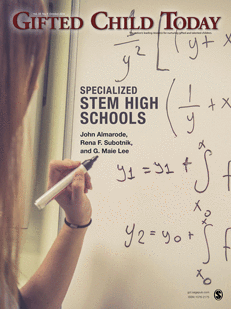From the abstract: "Until recently, reading instruction for early grades has focused on fiction. However, the Common Core State Standards and the Next Generation Science Standards both emphasize the reading of nonfiction texts to gain specific skill sets for analyzing information. Research has shown that gifted students and children with culturally/linguistically diverse backgrounds may find nonfiction texts more engaging to their interests than fiction. Nonfiction can activate prior learning and encourage students to learn to categorize and synthesize information, especially when combined with scientific inquiry. In this article, the authors explore the new standards-based emphasis on reading nonfiction, the skills built by students’ reading nonfiction with a focus on gifted students from culturally/linguistically different and economically disadvantaged families, and we share one approach to including nonfiction in elementary classrooms through the U-STARS~PLUS Science & Nonfiction Connections, a program for recognizing and supporting underrepresented gifted populations."
2016
Job, J., & Coleman, M. R. (2016). The importance of reading in earnest: Non-fiction for young children. Gifted Child Today, 39(3), 154-163.
10.1177/1076217516644635

